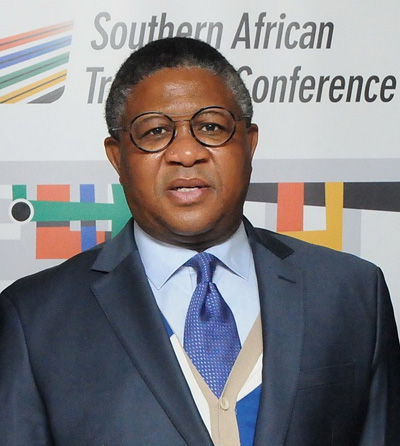Mbalula focuses on digital disruption

Digital disruption and its effect on the transport industry held the spotlight at the 2019 Southern African Transport Conference (SATC), which was staged this week in Pretoria
In his opening address at this year’s SATC, South Africa’s Minister of Transport, Fikile Mbalula, described the country as being somewhere between a late responder to technology-based mobility solutions and a pioneer in the field.
“As government, we acknowledge the international trend towards applying the growing power of information and communication technology in transforming mobility services. They provide us with an opportunity to maximise the opportunities and harness the potential of these new technologies to better plan and provide for the future mobility of our cities,” he told delegates.
Among a number of examples he cited on the pioneering front, Mbalula said government had initiated implementation of prepaid smartcards for use in public transport by people without access to bank accounts, adding that the next wave of shared and connected mobility solutions would impact the manner in which additional services would be integrated.
“Despite the various initiatives in new technologies, we need to acknowledge that the next wave of innovation in the coming ten to 20 years has the potential to further transform access and mobility services and make them efficient and seamless,” he said.
According to Mbalula, areas of short- to medium-term potential include:
- Promoting demand-based services like car-sharing, bike-sharing and ride-sharing schemes;
- Promoting e-hailing initially and then shared-vehicle schemes as alternatives to private car use;
- Linking e-hailing schemes to assist in first- and last-mile solutions to access public-transport networks in cities;
- Utilising the data warehouse capability developed by the South African National Roads Agency Limited (Sanral) to provide a platform for tracking public-transport operations and contracts;
- Utilising Sanral infrastructure and platforms to host mobility accounts, enabling users of any form of public-transport service to settle payments without having to shell out separate amounts to multiple municipal or other vendors. The accounts could include anything from parking charges to toll fees, with the aim of eventually serving as a platform for full fare integration across different operators and travel modes.
 “The challenge going forward is how fast policy makers, regulators and users will adapt and keep up with the new changes and the speed at which they are occurring. Another step forward is to start planning our cities and public-transport systems with the upcoming changes in mind. As a country, we are still a long way off to transition from driver-operated to autonomous technology such as self-drive buses,” he said.
“The challenge going forward is how fast policy makers, regulators and users will adapt and keep up with the new changes and the speed at which they are occurring. Another step forward is to start planning our cities and public-transport systems with the upcoming changes in mind. As a country, we are still a long way off to transition from driver-operated to autonomous technology such as self-drive buses,” he said.
Referencing the killing of truck drivers and the torching of vehicles in protest against the transport industry’s employment of foreign nationals, Mbalula said: “If competition for employment in the trucking business generates violence, what would the squeeze by driverless trucks do? New technologies will fundamentally change the nature of work across industries, but southern Africa needs to work towards reducing unemployment, as well as income and gender inequality.”
He added that acceptance of driverless vehicles remains a dilemma for many potential customers. “Automated systems may fail, and are susceptible to cyber-attacks. There is also a risk of misusing the generated private data. Further, construction of infrastructure will be very expensive – these are issues in which I would like to engage Sanral, the Road Traffic Management Corporation, the Road Traffic Infringement Agency and other entities across transport modes.”
In a briefing to media representatives following his speech, Mbalula said government was in the process of developing a solution to the prolonged e-tolling impasse. In this regard he was leading a task team that had been established by President Cyril Ramaphosa to discuss options.
“Our report will be tabled soon. We know that there are robust views that come from the Treasury in terms of the debt that is owed. We know there are views in relation to our borrowing capacity and the bond market,” he said. “Despite this, I promise that the matter will be resolved by the end of August.”
Published by
Focus on Transport
focusmagsa




